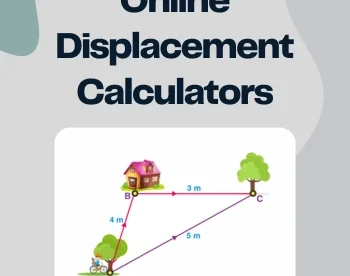5 Best Free Online Joint Probability Calculator Websites
Here is a list of best free online joint probability calculator websites. Joint probability (P(A∩B) or P (A and B)) is the probability of occurring two or more events at the same time. It helps users estimate the likelihood of two events A and B happening together. There are multiple use cases of joint probability calculation such as assessing the independence of two events, risk assessment of the likelihood of two events occurring simultaneously, etc. If you also want to calculate the joint probability of two events, then check out these online joint probability calculator websites.
Through these websites, users can quickly find out the joint probability of two events occurring together. To do that, these websites use the conditional probability of A, probability of event B, Probability of A and B, etc. Some of these websites can also calculate the joint probability for both dependent events and independent events. Besides this, users also get the formula to calculate joint probability. To explain joint probability, these websites use Venn diagrams and calculation examples. To help out users, I have also included the necessary calculation steps in the description of each website.
These websites offer multiple online tools such as Complementary Probability Calculator, Conditional Probability Calculator, Union Probability Calculator, etc. Go through the list to learn more about these websites.
My Favorite Online Joint Probability Calculator Website:
statskingdom.com is my favorite website as it can calculate joint probability for both dependent and independent events.
You can also check out lists of best free Online Binomial Probability Calculator, Online Inequality Calculator, and Online Profitability Index Calculator websites.
Comparison Table:
| Features/Website Names | Can calculate joint probability of both dependent and independent events | Shows Calculation formulas | Offers joint probability Venn Diagram |
|---|---|---|---|
| statskingdom.com | ✓ | ✓ | ✓ |
| danielsoper.com | x | ✓ | x |
| calculator.net | x | ✓ | ✓ |
| analyticscalculators.com | x | ✓ | x |
| omnicalculator.com | x | ✓ | x |
statskingdom.com
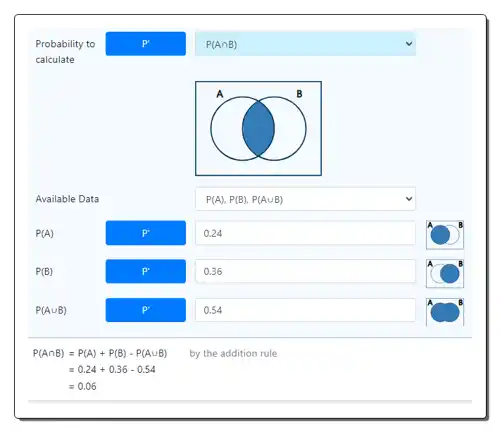
statskingdom.com is a free online joint probability calculator website. This website can calculate the joint probability for both Dependent and Independent events. In the case of a Dependent Event, it needs three input values namely P(A), P(B), and P(A ∪ B). It only needs two parameters namely P(A) and P(A ∪ B) to calculate the joint probability for two independent events. It also shows the joint probability formulas for both dependent and independent events. Plus, it uses a Venn diagram to explain joint probability. Now, follow the below steps.
How to calculate joint probability online using statskingdom.com:
- Visit this website and access the Probability Calculator.
- After that, choose either the Independent Events or Dependent Events section.
- Choose the joint probability P(A ∩ B) option from the Probability to Calculate menu.
- Next, enter all required input values.
- Finally, hit the Calculate button to view the calculated joint probability value.
Additional Features:
- This website has multiple online tools such as Statistics Calculators, Regression Calculators, Confidence Interval Calculators, Distribution Calculators, and more.
Final Thoughts:
It is one of the best free online joint probability calculator websites that can calculate joint probability for both dependent and independent events.
| Pros | Cons |
|---|---|
| Shows Venn diagram of joint probability | |
| Can calculate joint probability for both dependent and independent events | |
| Shows probability calculation formulas |
danielsoper.com
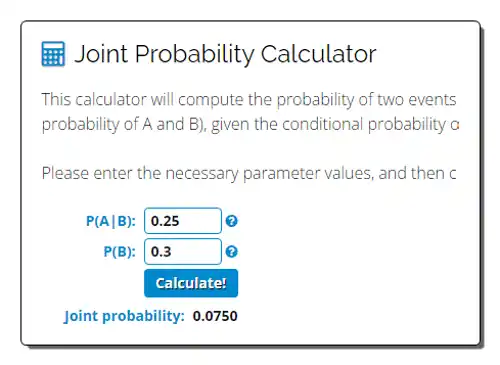
danielsoper.com is a free online joint probability calculator website. Using this website, users can find out the probability of two events occurring together. To perform this calculation, it mainly needs two parameters namely P(A|B) and P(B). P(A|B) represents the conditional probability of event A, given that event B has occurred. The P(B) represents the probability of event B. It also shows the formula to calculate the Joint probability. Now, follow the below steps.
How to calculate joint probability online using danielsoper.com:
- Visit this website and access the Joint Probability Calculator.
- After that, enter P(A|B) and P(B) values.
- Now, click on the Calculate button to start the calculation process.
- Finally, view the calculated joint probability value.
Additional Features:
- This website offers multiple statistics calculators like Beta Function, Binomial Distribution, Confidence Intervals, Correlations, Effect Size, and more.
Final Thoughts:
It is a good online joint probability calculator website that quickly calculates the probability of two events occurring together.
| Pros | Cons |
|---|---|
| Shows calculation formula | |
| Easy-to-use |
calculator.net
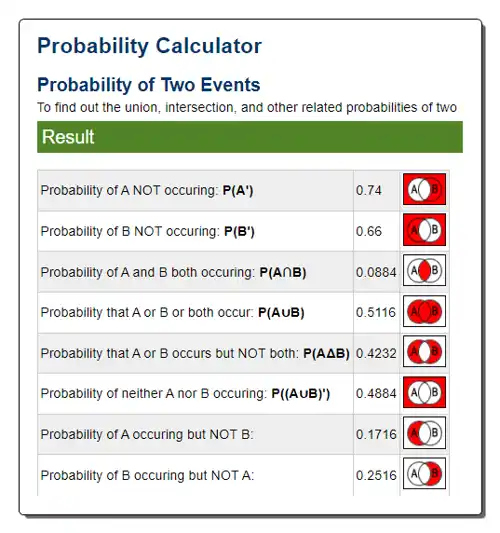
calculator.net is another free online joint probability calculator website. This website offers a simple probability calculator that can calculate multiple probability types that can occur between two events like probability of P(A), Probability of A NOT occurring P(A’), Probability of A or B or both occurring P(A U B), etc. From available probability calculators, users need to choose the P (A ∩ B) option that indicates the joint probability of two events A and B occurring together.
This website also explains the joint probability of two events with the help of a Venn diagram and some examples. It also provides the joint probability calculation formulas. Now, follow the below steps.
How to calculate joint probability of two events online using calculator.net:
- Go to this website and access the Probability Calculator.
- After that, enter the values of P(A) and P (B) in the input sections.
- Next, click on the Calculate button to start the calculation process.
- Finally, view the calculated joint probability (P(A∩B)) value.
Additional Features:
- This website offers multiple probability calculators like Probability of A NOT occurring: P(A’), Probability that A or B occurs but NOT both: P(AΔB), Probability of B NOT occurring: P(B’), etc.
Final Thoughts:
It is another good online joint probability calculator website that can calculate multiple possibilities that can occur between two independent events.
| Pros | Cons |
|---|---|
| Shows calculation formula | |
| Explains joint probability using examples and a Venn diagram |
analyticscalculators.com
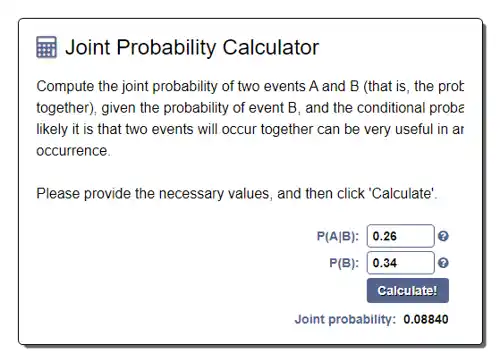
analyticscalculators.com is another free online joint probability calculator website. Through this website, users can easily find out the joint probability or probability of two events occurring together given the probability of event B and conditional probability of event A. To perform the calculation, users need to enter the values of A(A|B) and P(B) parameters. Based on input values, it calculates and shows the joint probability value. It also shows the formula that it uses to calculate the joint probability of two events. Now, follow the below steps.
How to calculate joint probability online using anslyticscalculators.com:
- Visit this website and go to the Joint Probability Calculator section.
- Now, enter the two required values
- Next, click on the Calculate! button to start the calculation process.
Additional Features:
- This website has multiple related calculators like Complementary Probability Calculator, Conditional Probability Calculator, Union Probability Calculator, Binomial Probability Calculator, and more.
Final Thoughts:
It is another good online joint probability calculator website that anyone can use to quickly find out the joint probability of two events.
| Pros | Cons |
|---|---|
| Shows calculation formula | |
| Offers multiple probability calculators |
omnicalculator.com
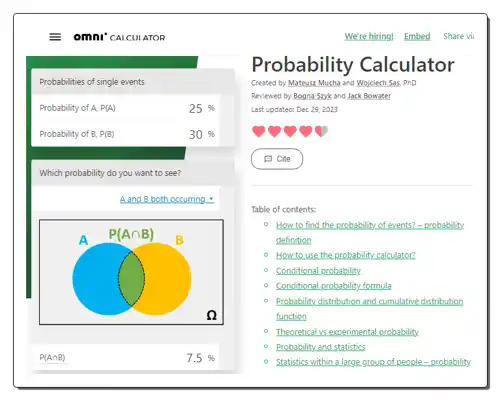
omnicalculator.com is another free online joint probability calculator website. This website offers a Probability calculator that can calculate the joint probability of two events, the probability of occurring neither event, probability of occurring one event but not other, etc. This website also offers steps to find the probability of events and shows the formulas required to calculate various probability events.
To calculate the joint probability, it uses the Probability of event A and probability of event B values in percentage format. After doing the calculation, it shows the joint probability value in percentage. Now, check out the below steps.
How to calculate joint probability online using omnicalculator.com:
- Launch this website and go to its Probability calculator.
- Now, browse and select A and B both occurring options.
- Next, enter the probability of A and probability of B values.
- Finally, view the calculated joint probability value.
Additional Features:
- This website offers a variety of calculators associated with fields like Physics, maths, Chemistry, Health, Sports, Finance, and more.
Final Thoughts:
It is another good online joint probability calculator that anyone can use with ease.
| Pros | Cons |
|---|---|
| Can calculate multiple probability events | |
| Shows probability calculation formulas |
Frequently Asked Questions
For independent events: P(A and B) = P(A) * P(B) and for Dependent events: P(A and B) = P(A) * P(B | A).
Factorizing a joint probability involves expressing it as a product of simpler terms, typically consisting of marginal and conditional probabilities. This decomposition can be useful for understanding the relationship between multiple events and simplifying calculations involving them.
In probability theory, joint probability refers to the likelihood of two or more events happening together. It tells you how likely it is that both event A and event B will occur at the same time.
Rolling a 6 on a die and flipping a coin to heads: The probability of rolling a 6 is 1/6. The probability of flipping a heads is 1/2. Since these events are independent, you multiply their probabilities: (1/6) * (1/2) = 1/12. The joint probability of both events occurring is 1/12.
If the events you're considering don't influence each other, like flipping a coin and rolling a die, you can simply multiply their individual probabilities to get the joint probability. This is because their occurrences are completely separate and don't affect each other's likelihood. If the events affect each other's likelihood, like drawing two cards from a deck without replacing the first, you cannot simply multiply their individual probabilities. This is because the first event (drawing one card) changes the pool of cards available for the second draw, impacting its probability.
Naveen Kushwaha
Passionate about tech and science, always look for new tech solutions that can help me and others.
About Us
We are the team behind some of the most popular tech blogs, like: I LoveFree Software and Windows 8 Freeware.
More About UsArchives
- May 2024
- April 2024
- March 2024
- February 2024
- January 2024
- December 2023
- November 2023
- October 2023
- September 2023
- August 2023
- July 2023
- June 2023
- May 2023
- April 2023
- March 2023
- February 2023
- January 2023
- December 2022
- November 2022
- October 2022
- September 2022
- August 2022
- July 2022
- June 2022
- May 2022
- April 2022
- March 2022
- February 2022
- January 2022
- December 2021
- November 2021
- October 2021
- September 2021
- August 2021
- July 2021
- June 2021
- May 2021
- April 2021
- March 2021
- February 2021
- January 2021
- December 2020
- November 2020
- October 2020
- September 2020
- August 2020
- July 2020
- June 2020
- May 2020
- April 2020
- March 2020
- February 2020
- January 2020
- December 2019
- November 2019
- October 2019
- September 2019
- August 2019
- July 2019
- June 2019
- May 2019
- April 2019
- March 2019
- February 2019
- January 2019
- December 2018
- November 2018
- October 2018
- September 2018
- August 2018
- July 2018
- June 2018
- May 2018
- April 2018
- March 2018
- February 2018
- January 2018
- December 2017
- November 2017
- October 2017
- September 2017
- August 2017
- July 2017
- June 2017
- May 2017
- April 2017
- March 2017
- February 2017
- January 2017
- December 2016
- November 2016
- October 2016
- September 2016
- August 2016
- July 2016
- June 2016
- May 2016
- April 2016
- March 2016
- February 2016
- January 2016
- December 2015
- November 2015
- October 2015
- September 2015
- August 2015
- July 2015
- June 2015
- May 2015
- April 2015
- March 2015
- February 2015
- January 2015
- December 2014
- November 2014
- October 2014
- September 2014
- August 2014
- July 2014
- June 2014
- May 2014
- April 2014
- March 2014

